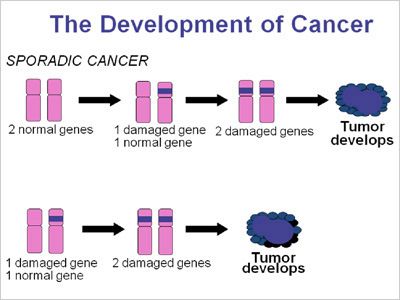The word cancer strikes fear into even the bravest of hearts. Breast cancer is no different and with 1 in 8 women, and 1 in 870 men, contracting the disease, it touches the lives of many.
For some women with a BRCA1 gene mutation, the risk of breast cancer is as high as 80%.
What is breast cancer?
Quite simply, it is an uncontrolled growth of breast cells. We all have genes responsible for regulating this growth and keeping the cells healthy, but sometimes an abnormality develops which prevents this from happening. A tumor then develops, which can either be perfectly harmless or malignant, meaning cancerous.
Breast cancer usually starts in the cells found in the lobules, or milk-producing glands, or in the ducts that drain milk flow to the nipple. However, it can also start in the stromal tissues. As the cancer takes hold, it will spread to the rest of the breast tissue and then on to the underarm lymph nodes. It is then that the cancer will have a clear path to other parts of the body and can be much more difficult to treat.

What causes breast cancer?
Genetic abnormality is always the cause of breast cancer but there can be different causes within that.
85-90% of breast cancer cases are caused as a result of aging, as the cells change and mutate over time. In fact, 1 in 3 women who get breast cancer are aged over 70. Only 5-10% are due to a genetic abnormality inherited from a parent.
Symptoms to watch out for
Lump in either the breast or underarm area
Swelling of part or all of the breast
Breast pain
Nipple pain
Change in appearance of the nipple or breast skin
Nipple discharge
It is important to point out that pain is not a common symptom of breast cancer and is usually caused by another condition. In fact, all of these symptoms could be an indicator of something else but you should always visit your doctor if you notice any of them, just to be safe.
It is absolutely vital that you check yourself regularly, about once a month is recommended. Familiarize yourself with your breasts, including their shape and appearance. This can be different for everyone and will change as you age, so a regular examination helps you to determine what is normal for you.
Check every part of your breast, moving your arms around to feel for any lumps. Get used to how these different areas feel and if you notice any change at all, however small, make an appointment with your doctor.
It is a good idea to keep a diary, noting how your breasts feel and any changes that you find. You will probably find there is a recurring pattern throughout your monthly cycle, as your breasts will change in both feeling and appearance as your hormones do their thing.
The 5 Steps of a Breast Self-Exam
Genetic testing

How can you prevent breast cancer?
You can’t prevent breast cancer caused by a genetic inheritance but there are things you can do to lower the risk in all other cases.
Limit alcohol intake
Bad news I’m afraid, the more alcohol you consume, the greater your risk of developing breast cancer. Although the advice on weekly alcohol consumption is to stick to no more than 14 units per week (for both men and women now) and to have at least 2 or 3 dry days per week, you can increase the risk of developing breast cancer by having just 1 drink per day.
Avoid cigarettes
Clinical trials have found a link between smoking and breast cancer, with premenopausal women being particularly at risk. So don’t smoke. Ever.
Maintain a healthy weight
If you are overweight, your risk of developing breast cancer increases. Post-menopausal women are particularly vulnerable to this. Exercising regularly and following a healthy diet, will help you to achieve a healthy weight and body fat ratio. There is evidence to suggest that following a Mediterranean diet with plenty of fruit and vegetables, as well as oily fish, can benefit your health in many ways.
Limit hormone therapy
If you have combination hormone therapy, such as Hormone Replacement Therapy (HRT), for more than 3 years, you increase your risk of developing breast cancer. There may be alternative treatments available, so speak to your doctor if you are concerned about this risk.
Breast-feed
There is a line of thought out there that breast feeding may help to prevent breast cancer from developing later in life. If you are able to breast-feed, the longer you do so the better the protection.
If you do develop breast cancer, try not to panic. Easier said than done I know. However, your doctor will explain everything, including your prognosis and the treatments available. Make sure you get plenty of support from family and friends and try to remain positive.

